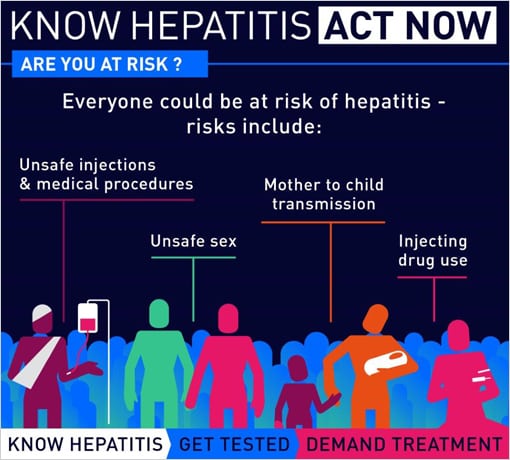
The World Hepatitis Day is marked on 28th of July by health organizations around the world. The common aim of multiple campaigns is to raise awareness and urge people to seek treatment.
Viral hepatitis infection is widely spread, affecting 400 million people worldwide – over 10 times the number of people infected with HIV. Globally, about 1.4 million people die each year from hepatitis. It is estimated that only 5% of people with chronic hepatitis know of their infection, and less than 1% have access to treatment.
Yet, hepatitis is fully preventable and treatable: there are effective vaccines and treatments for hepatitis B, and over 90% of people with hepatitis C can be cured with treatment. The vision of eliminating hepatitis as a public health threat by 2030 can be achieved, if people and countries affected by this disease were better equipped and enabled to “know hepatitis” and “act now”.
Know hepatitis – Are you at risk?
- Anyone could be at risk of hepatitis due to the size of the global epidemic (at least 10 times the HIV epidemic).
- Hepatitis B and C infections are transmitted through contaminated blood as well as through contaminated needles and syringes in healthcare setting and among people who inject drugs. The viruses can also be transmitted through unsafe sex and from an infected mother to her newborn child.
- With better information and knowledge about hepatitis risks, people can prevent themselves from getting infected and passing the infection on to others. To do this, people should seek testing and learn if they need treatment.
Know hepatitis – Get tested
- Increasing access to hepatitis testing is key to scaling up hepatitis treatment and care.
- An estimated 95% of people with hepatitis are unaware of their infection, in part due to a lack of awareness and lack of access to testing services in countries.
WHO will release its first hepatitis testing guidelines in 2016. The guidelines will provide guidance on who should be tested, and will recommend simple testing strategies to help country efforts to scale up hepatitis testing, treatment and care.
Know hepatitis – Demand treatment
- Globally, most people who need treatment have not been treated, largely due to a lack of awareness, and access to hepatitis treatment services.
- Over 90% of people with hepatitis C can be completely cured of the virus within 3–6 months.
- Appropriate treatment of hepatitis B and C can prevent the development of the major life-threatening complications of chronic liver disease: cirrhosis and liver cancer.





































